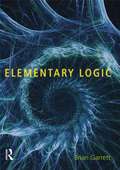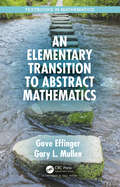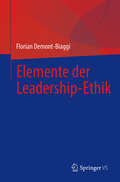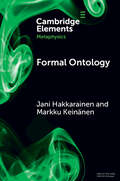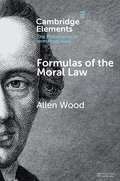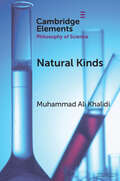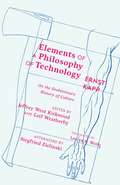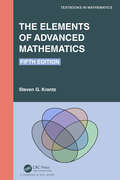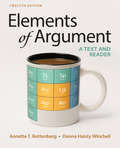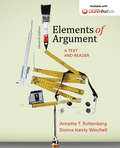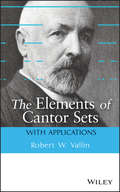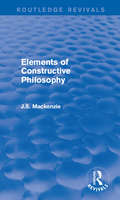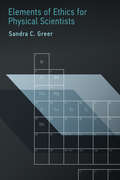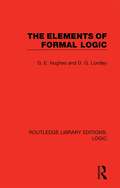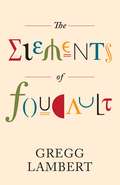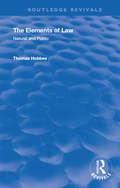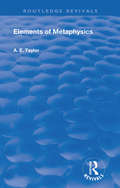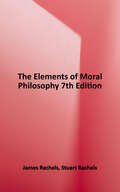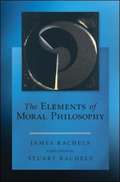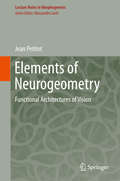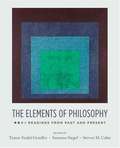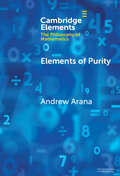- Table View
- List View
Elementary Logic
by Brian GarrettElementary Logic explains what logic is, how it is done, and why it can be exciting. The book covers the central part of logic that all students have to learn: propositional logic. It aims to provide a crystal-clear introduction to what is often regarded as the most technically difficult area in philosophy. The book opens with an explanation of what logic is and how it is constructed. Subsequent chapters take the reader step-by-step through all aspects of elementary logic. Throughout, ideas are explained simply and directly, with the chapters packed with overviews, illustrative examples, and summaries. Each chapter builds on previous explanation and example, with the final chapters presenting more advanced methods. After a discussion of meta-logic and logical systems, the book closes with an exploration of how paradoxes can exist in the world of logic. Elementary Logic's clarity and engagement make it ideal for any reader studying logic for the first time.
An Elementary Transition to Abstract Mathematics (Textbooks in Mathematics)
by Gove Effinger Gary L. MullenAn Elementary Transition to Abstract Mathematics will help students move from introductory courses to those where rigor and proof play a much greater role. The text is organized into five basic parts: the first looks back on selected topics from pre-calculus and calculus, treating them more rigorously, and it covers various proof techniques; the second part covers induction, sets, functions, cardinality, complex numbers, permutations, and matrices; the third part introduces basic number theory including applications to cryptography; the fourth part introduces key objects from abstract algebra; and the final part focuses on polynomials. Features: The material is presented in many short chapters, so that one concept at a time can be absorbed by the student. Two "looking back" chapters at the outset (pre-calculus and calculus) are designed to start the student’s transition by working with familiar concepts. Many examples of every concept are given to make the material as concrete as possible and to emphasize the importance of searching for patterns. A conversational writing style is employed throughout in an effort to encourage active learning on the part of the student.
Elemente der Leadership-Ethik
by Florian Demont-BiaggiDieses Buch begibt sich auf eine wissenschaftliche Suche, um die Eckwerte und Grundlagen einer Ethik der strategischen Führung zu finden und auszuarbeiten. Ausgehend vom Phänomen der Macht und des Machtmissbrauchs und seiner Beziehung zum Problem der Leadership entwickelt der Autor seine Führungsethik einerseits in der Auseinandersetzung mit Ansätzen aus der Sozialpsychologie, der Moral- und der allgemeinen Psychologie, der Psychotherapie und der Technikphilosophie, andererseits in der Kritik bereits etablierter Debatten, z. B. der Theorie der authentischen Führung. In das Buch gehen auch neuere Aspekte zum Thema ein, so die Frage nach der Digitalisierung als Führungswerkzeug.
Elements in Metaphysics: Formal Ontology (Elements In Metaphysics Ser.)
by Jani Hakkarainen Markku KeinänenElements in the Philosophy of Immanuel Kant: Formulas of the Moral Law (Elements In The Philosophy Of Immanuel Kant Series)
by Allen WoodThis Element defends a reading of Kant's formulas of the moral law in Groundwork of the Metaphysics of Morals. It disputes a long tradition concerning what the first formula (Universal Law/Law of Nature) attempts to do. <P><P>The Element also expounds the Formulas of Humanity, Autonomy and the Realm of Ends, arguing that it is only the Formula of Humanity from which Kant derives general duties, and that it is only the third formula (Autonomy/Realm of Ends) that represents a complete and definitive statement of the moral principle as Kant derives it in the Groundwork. The Element also disputes the claim that the various formulas are 'equivalent', arguing that this claim is either false or else nonsensical because it is grounded on a false premise about what Kant thinks a moral principle is for.
Elements in the Philosophy of Science: Natural Kinds (Elements In The Philosophy Of Science Ser.)
by Muhammad Ali KhalidiElements of a Philosophy of Technology: On the Evolutionary History of Culture (Posthumanities #99)
by Ernst KappThe first philosophy of technology, constructing humans as technological and technology as an underpinning of all culture Ernst Kapp was a foundational scholar in the fields of media theory and philosophy of technology. His 1877 Elements of a Philosophy of Technology is a visionary study of the human body and its relationship with the world that surrounds it. At the book&’s core is the concept of &“organ projection&”: the notion that humans use technology in an effort to project their organs to the outside, to be understood as &“the soul apparently stepping out of the body in the form of a sending-out of mental qualities&” into the world of artifacts.Kapp applies this theory of organ projection to various areas of the material world—the axe externalizes the arm, the lens the eye, the telegraphic system the neural network. From the first tools to acoustic instruments, from architecture to the steam engine and the mechanic routes of the railway, Kapp&’s analysis shifts from &“simple&” tools to more complex network technologies to examine the projection of relations. What emerges from Kapp&’s prophetic work is nothing less than the emergence of early elements of a cybernetic paradigm.
The Elements of Advanced Mathematics (Textbooks in Mathematics)
by Steven G. KrantzThis book has enjoyed considerable use and appreciation during its first four editions. With hundreds of students having learned out of early editions, the author continues to find ways to modernize and maintain a unique presentation. What sets the book apart is the excellent writing style, exposition, and unique and thorough sets of exercises. This edition offers a more instructive preface to assist instructors on developing the course they prefer. The prerequisites are more explicit and provide a roadmap for the course. Sample syllabi are included. As would be expected in a fifth edition, the overall content and structure of the book are sound. This new edition offers a more organized treatment of axiomatics. Throughout the book, there is a more careful and detailed treatment of the axioms of set theory. The rules of inference are more carefully elucidated. Additional new features include: An emphasis on the art of proof. Enhanced number theory chapter presents some easily accessible but still-unsolved problems. These include the Goldbach conjecture, the twin prime conjecture, and so forth. The discussion of equivalence relations is revised to present reflexivity, symmetry, and transitivity before we define equivalence relations. The discussion of the RSA cryptosystem in Chapter 8 is expanded. The author introduces groups much earlier. Coverage of group theory, formerly in Chapter 11, has been moved up; this is an incisive example of an axiomatic theory. Recognizing new ideas, the author has enhanced the overall presentation to create a fifth edition of this classic and widely-used textbook.
Elements of Argument
by Annette T. Rottenberg Donna Haisty WinchellElements of Argument teaches students how to approach, develop, and defend arguments one element at a time. This comprehensive, accessible text carefully scaffolds argument for students, explaining approaches to argumentation, (including Aristotelian, Toulmin, and Rogerian models as well as Stasis Theory questions), critical reading, and argument analysis. The major components of argumentation--claims, support, assumptions, logic--are explained in depth, and a robust research section shows students how to find, incorporate, and build on existing arguments. This Twelfth Edition has also been updated with more sourced readings than ever before, further reinforcing the importance of research and synthesis. Finally, the anthology includes debates and casebooks on unsettled current issues as well as timeless, classic arguments, making Elements of Argument a comprehensive resource for the argument classroom.
Elements of Argument
by Donna Haisty Winchell Annette T. RottenbergPACKAGE THIS TITLE WITH OUR 2016 MLA SUPPLEMENT, Documenting Sources in MLA Style (package ISBN-13: 9781319084639). Get the most recent updates on MLA citation in a convenient, 40-page resource based on The MLA Handbook, 8th Edition, with plenty of models. Browse our catalog or contact your representative for a full listing of updated titles and packages, or to request a custom ISBN. Elements of Argument combines a thorough argument text on critical thinking, reading, writing, and research with an extensive reader on both current and timeless controversial issues. It presents everything students need to analyze, research, and write arguments. Elements of Argument covers Toulmin, Aristotelian, and Rogerian models of argument and has been thoroughly updated with current selections students will want to read. With three-quarters of the readings new to this edition (and with additional multimodal selections available online), expanded coverage of key rhetorical issues, reorganized research chapters, and a fresh design, Elements of Argument is a truly flexible classroom resource. An e-book is available at half the price of the print book. Our newest set of online materials, LaunchPad Solo, provides all the key tools and course-specific content that you need to teach your class. Get all our great course-specific materials in one fully customizable space online; then assign and mix our resources with yours. To package LaunchPad Solo free with Elements of Argument, Eleventh Edition, use 978-1-319-01079-9.
The Elements of Cantor Sets--with Applications
by Robert W. VallinA systematic and integrated approach to Cantor Sets and their applications to various branches of mathematics The Elements of Cantor Sets: With Applications features a thorough introduction to Cantor Sets and applies these sets as a bridge between real analysis, probability, topology, and algebra. The author fills a gap in the current literature by providing an introductory and integrated perspective, thereby preparing readers for further study and building a deeper understanding of analysis, topology, set theory, number theory, and algebra. The Elements of Cantor Sets provides coverage of: Basic definitions and background theorems as well as comprehensive mathematical details A biography of Georg Ferdinand Ludwig Philipp Cantor, one of the most significant mathematicians of the last century Chapter coverage of fractals and self-similar sets, sums of Cantor Sets, the role of Cantor Sets in creating pathological functions, p-adic numbers, and several generalizations of Cantor Sets A wide spectrum of topics from measure theory to the Monty Hall Problem An ideal text for courses in real analysis, topology, algebra, and set theory for undergraduate and graduate-level courses within mathematics, computer science, engineering, and physics departments, The Elements of Cantor Sets is also appropriate as a useful reference for researchers and secondary mathematics education majors.
Elements of Constructive Philosophy (Routledge Revivals)
by J.S. MackenzieJ.S. Mackenzie surveys Western philosophy from Socrates to the New Realists in an uncomplicated and approachable style. Originally published in 1917, this text serves as a useful introduction to philosophy and well-summarises the key theories of great philosophers throughout the centuries and their bearing on early twentieth-century thought. It is ideal for students of Philosophy, both for beginners and the more advanced.
Elements of Ethics for Physical Scientists
by Sandra C. GreerA guide to the everyday decisions about right and wrong faced by physical scientists and research engineers. This book offers the first comprehensive guide to ethics for physical scientists and engineers who conduct research. Written by a distinguished professor of chemistry and chemical engineering, the book focuses on the everyday decisions about right and wrong faced by scientists as they do research, interact with other people, and work within society. The goal is to nurture readers' ethical intelligence so that they know an ethical issue when they see one, and to give them a way to think about ethical problems. After introductions to the philosophy of ethics and the philosophy of science, the book discusses research integrity, with a unique emphasis on how scientists make mistakes and how they can avoid them. It goes on to cover personal interactions among scientists, including authorship, collaborators, predecessors, reviewers, grantees, mentors, and whistle-blowers. It considers underrepresented groups in science as an ethical issue that matters not only to those groups but also to the development of science, and it examines human participants and animal subjects. Finally, the book examines scientifically relevant social issues, including public policy, weapons research, conflicts of interest, and intellectual property. Each chapter ends with discussion questions and case studies to encourage debate and further exploration of topics. The book can be used in classes and seminars in research ethics and will be an essential reference for scientists in academia, government, and industry.
The Elements of Formal Logic (Routledge Library Editions: Logic)
by G. E. Hughes D. G. LondeyOriginally published in 1965. This is a textbook of modern deductive logic, designed for beginners but leading further into the heart of the subject than most other books of the kind. The fields covered are the Propositional Calculus, the more elementary parts of the Predicate Calculus, and Syllogistic Logic treated from a modern point of view. In each of the systems discussed the main emphases are on Decision Procedures and Axiomatisation, and the material is presented with as much formal rigour as is compatible with clarity of exposition. The techniques used are not only described but given a theoretical justification. Proofs of Consistency, Completeness and Independence are set out in detail. The fundamental characteristics of the various systems studies, and their relations to each other are established by meta-logical proofs, which are used freely in all sections of the book. Exercises are appended to most of the chapters, and answers are provided.
The Elements of Foucault (Posthumanities #55)
by Gregg LambertA new conceptual diagram of Foucault&’s original vision of the biopolitical order The history around the critical reception of Michel Foucault&’s published writings is troubled, according to Gregg Lambert, especially in light of the controversy surrounding his late lectures on biopolitics and neoliberal governmentality. In this book, Lambert&’s unique approach distills Foucault&’s thought into its most basic components in order to more fully understand its method and its own immanent rules of construction.The Elements of Foucault presents a critical study of Foucault&’s concept of method from the earlier History of Sexuality, Volume 1, to his later lectures. Lambert breaks down Foucault&’s post-1975 analysis of the idea of biopower into four elements: the method, the conceptual device (i.e., dispositif), the grid of intelligibility, and the notion of &“milieu.&” Taken together, these elements compose the diagram of Foucault&’s early analysis and the emergence of the neoliberal political economy. Lambert further delves into how Foucault&’s works have been used and misused over time, challenging the periodization of Foucault&’s later thought in scholarship as well as the major and most influential readings of Foucault by other contemporary philosophers—in particular Gilles Deleuze and Giorgio Agamben. The Elements of Foucault is the first generally accessible, yet rigorous and comprehensive, discussion of lectures and major published works of Foucault&’s post-1975 theory of biopower and of the major innovation of the concept of dispositif. It is also the first critical work to address the important influence of French philosopher Georges Canghuilhem on Foucault&’s thought.
The Elements of Law: Natural and Politic (Routledge Revivals)
by Thomas HobbesOriginally published in 1889, Ferdinand Tonnies published versions of two works by Thomas Hobbes. His editions of The Elements of Law: Natural and Politic and of Behemoth: or The Long Parliament were the first modern critical editions, based on manuscripts of works by Hobbes. Completed in 1640, The Elements of Law was Hobbes's first systematic political work. The book helps us see Hobbes's mind at work, for it is the first version of his later political works.
Elements of Logical Reasoning
by Jan Von Plato Aptara. IncSome of our earliest experiences of the conclusive force of an argument come from school mathematics: faced with a mathematical proof, we cannot deny the conclusion once the premises have been accepted. Behind such arguments lies a more general pattern of 'demonstrative arguments' that is studied in the science of logic. Logical reasoning is applied at all levels, from everyday life to advanced sciences, and a remarkable level of complexity is achieved in everyday logical reasoning, even if the principles behind it remain intuitive. Jan von Plato provides an accessible but rigorous introduction to an important aspect of contemporary logic: its deductive machinery. He shows that when the forms of logical reasoning are analysed, it turns out that a limited set of first principles can represent any logical argument. His book will be valuable for students of logic, mathematics and computer science.
Elements of Metaphysics (Routledge Revivals)
by A. E TaylorFirst published in 1903, Taylor endeavours to provide a detailed study of metaphysic as a discipline. Opening with a brief history of metaphysics, the book explores topics including the problem of the metaphysician, the metaphysical method, subdivisions of metaphysics, ontology, reality, cosmology, rational psychology, morality, ethics and religion.
Elements of Moral Cognition
by John MikhailIs the science of moral cognition usefully modeled on aspects of Universal Grammar? Are human beings born with an innate 'moral grammar' that causes them to analyse human action in terms of its moral structure, with just as little awareness as they analyse human speech in terms of its grammatical structure? Questions like these have been at the forefront of moral psychology ever since John Mikhail revived them in his influential work on the linguistic analogy and its implications for jurisprudence and moral theory. In this seminal book, Mikhail offers a careful and sustained analysis of the moral grammar hypothesis, showing how some of John Rawls' original ideas about the linguistic analogy, together with famous thought experiments like the trolley problem, can be used to improve our understanding of moral and legal judgement.
The Elements of Moral Philosophy
by James Rachels Stuart RachelsFirmly established as the standard text for undergraduate courses in ethics, James Rachels and Stuart Rachels' The Elements of Moral Philosophy introduces readers to major moral concepts and theories through eloquent explanations and compelling, thought-provoking discussions.
The Elements of Moral Philosophy 8th Edition
by James Rachels Stuart RachelsThe Elements of Moral Philosophy by James Rachels and Stuart Rachels is a best-selling text for undergraduate courses in ethics. Thirteen thought-provoking chapters introduce readers to major moral concepts and theories in philosophy through clear, understandable explanations and compelling discussions.
Elements of Neurogeometry
by Jean PetitotThis book describes several mathematical models of the primary visual cortex, referring them to a vast ensemble of experimental data and putting forward an original geometrical model for its functional architecture, that is, the highly specific organization of its neural connections. The book spells out the geometrical algorithms implemented by this functional architecture, or put another way, the "neurogeometry" immanent in visual perception. Focusing on the neural origins of our spatial representations, it demonstrates three things: firstly, the way the visual neurons filter the optical signal is closely related to a wavelet analysis; secondly, the contact structure of the 1-jets of the curves in the plane (the retinal plane here) is implemented by the cortical functional architecture; and lastly, the visual algorithms for integrating contours from what may be rather incomplete sensory data can be modelled by the sub-Riemannian geometry associated with this contact structure. As such, it provides readers with the first systematic interpretation of a number of important neurophysiological observations in a well-defined mathematical framework. The book's neuromathematical exploration appeals to graduate students and researchers in integrative-functional-cognitive neuroscience with a good mathematical background, as well as those in applied mathematics with an interest in neurophysiology.
The Elements of Philosophy: Readings from Past and Present
by Susanna Siegel Steven M. Cahn Tamar Szabó GendlerThe Elements of Philosophy: Readings from Past and Present offers an extensive collection of classic and contemporary readings, organized topically into five main sections: Religion and Belief, Moral and Political Philosophy, Metaphysics and Epistemology, Philosophy of Mind and Language, and Life and Death. Within these broad areas, readings are arranged in clusters that address both traditional issues--such as the existence of God, justice and the state, knowledge and skepticism, and free will--and contemporary topics--including God and science, just war theory, vegetarianism, and time travel. Carefully chosen selections from a wide range of pre-20th-century philosophers are paired with writings from more than fifty leading contemporary philosophers and thinkers. The traditional philosophers represented range from Plato and Aristotle to Immanuel Kant and A. J. Ayer; the contemporary philosophers include Saul Kripke, David Lewis, Thomas Nagel, Derek Parfit, Hilary Putnam, Robert Nozick, Judith Jarvis Thomson, John Rawls, Bernard Williams, and Susan Wolf. Also included are selections from linguist Noam Chomsky, physicist Albert Einstein, and psychologist William James. Edited by a team of scholars who are also highly esteemed instructors, The Elements of Philosophy is uniquely student-friendly. A team of undergraduate philosophy majors played a central role in helping to select topics, choose readings, and identify terms likely to require clarification. In response to their suggestions, the volume includes detailed introductions to each section, explanatory footnotes that define unfamiliar terms and concepts, an extensive glossary, and a guide to further resources. A companion Instructor's Manual, available on CD, offers article summaries, suggested essay questions, reading guides, model handouts, and sample syllabi. One of the most extensive and expansive anthologies available, The Elements of Philosophy is an ideal choice for both general and targeted introductory philosophy courses.
Elements of Purity (Elements in the Philosophy of Mathematics)
by Andrew AranaA proof of a theorem can be said to be pure if it draws only on what is 'close' or 'intrinsic' to that theorem. In this Element we will investigate the apparent preference for pure proofs that has persisted in mathematics since antiquity, alongside a competing preference for impurity. In Section 1, we present two examples of purity, from geometry and number theory. In Section 2, we give a brief history of purity in mathematics. In Section 3, we discuss several different types of purity, based on different measures of distance between theorem and proof. In Section 4 we discuss reasons for preferring pure proofs, for the varieties of purity constraints presented in Section 3. In Section 5 we conclude by reflecting briefly on purity as a preference for the local and how issues of translation intersect with the considerations we have raised throughout this work.
Elements of the Philosophy of Right
by Georg Wilhelm Friedrich HegelThis book is a translation of a classic work of modern social and political thought. Elements of the Philosophy of Right, Hegel's last major published work, is an attempt to systematize ethical theory, natural right, the philosophy of law, political theory, and the sociology of the modern state into the framework of Hegel's philosophy of history. Hegel's work has been interpreted in radically different ways, influencing many political movements from far right to far left, and is widely perceived as central to the communitarian tradition in modern ethical, social, and political thought. This edition includes extensive editorial material informing the reader of the historical background of Hegel's text, and explaining his allusions to Roman law and other sources, making use of lecture materials which have only recently become available. The new translation is literal, readable, and consistent, and will be informative and scholarly enough to serve the needs of students and specialists alike.
